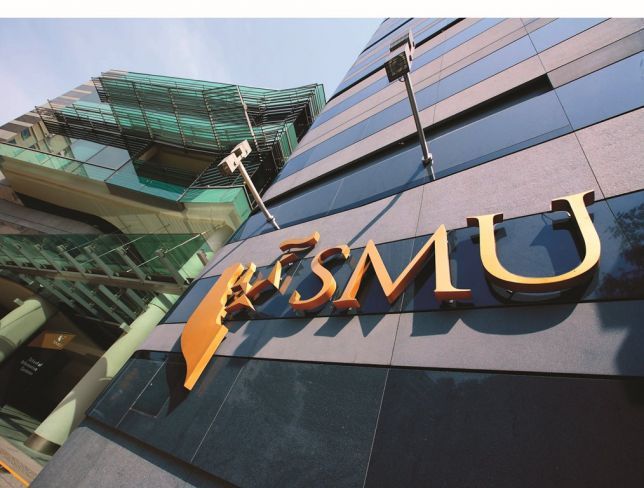
Singapore, 21 February 2019 (Thursday) – With the rapid growth of the digital economy and the ongoing efforts to transform Singapore through technology, there is strong demand in the public and private sectors for graduates with sound knowledge and training in computing.
Based on IMDA’s Annual Survey for Infocomm Media Manpower that was conducted in 2017, there is a strong demand for skilled professionals, as enterprises have forecast infocomm professionals to grow by 28,500 between 2018 and 2020.
In response to these industry trends and demand, the School of Information Systems at Singapore Management University (SMU) has strengthened its undergraduate curriculum with the introduction of two new degree programmes - Bachelor of Science (Computer Science) from the new academic year commencing in August 2019, and Bachelor of Science (Computing & Law) in August 2020.
Bachelor of Science (Computer Science) degree
- Objectives and description
The new Bachelor of Science (Computer Science) programme aims to equip students with technical skills to build computing products and solutions to thrive in the marketplaces and society. This requires an understanding of the interplay between computing theory and practice and the essential links between them; as well as fundamental business innovation, IT solution development and management skills.
The programme features a first major on IT Solution Development. Our courses cut across traditional technology components and equip students with skills to translate scientific principles and integrate the knowledge they learn holistically to develop real solutions to use cases.
Our curriculum nurtures a specialization in an up-and-coming technology track built on a foundational core that apply across industries, preparing graduates for the highly-demanded fields such as Artificial Intelligence, Cybersecurity, and Cyber-Physical Systems while equipping them with nimbleness to ride on future technology waves.
Students will also be encouraged to take up a second major on IT Solution Management, where they will learn to manage the development and deployment of computing solutions. They will gain broad-based exposure to software product management, IT solution architecture, as well as business, legal, and accounting aspects of IT.
- Outcome
The new programme will prepare students for a wide variety of job roles, including software engineer, product manager, artificial intelligence developer, full stack developer, as well as security penetration tester.
The School plans to admit about 45 students for the pioneer batch.
The Bachelor of Science (Computer Science) programme is the second degree programme by the School of Information Systems. The School has been offering the Bachelor of Science (Information Systems) degree programme since its inception in 2003.
Please refer to Annex A for the differences between computer science and information systems graduates.
Bachelor of Science (Computing & Law) degree
- Objectives and description
Starting from Academic Year 2020-2021, SMU School of Information Systems and School of Law will jointly offer a new degree programme in Computing and Law.
As Information Technology (IT) goes beyond automating backroom functions to transforming
business models and processes, innovators need to consider:
• How their innovations can be protected within the legal framework where they operate
• How to ensure that their business operations comply with pertinent legal, regulatory and contractual requirements
• How to address legal questions, as well as manage the technology and business risks posed by the innovations
There have been calls to pay heed to the technological wave sweeping the legal fraternity and to embrace new technology. Speaking at the opening of the legal year on 7 January 2019, Chief Justice Sundaresh Menon reiterated that technology has changed the way the legal sector works. “Today, successful lawyering requires far more than just the knowledge of the law. It demands competencies commonly associated with other disciplines, ranging from business and finance to project management and information technology. Consequently, law schools may need to do more than educate students in the law; they may also need to offer programmes that will equip students with the skills to find innovative solutions to the issues that they will be confronted with in contemporary legal practice.”
This changing landscape calls for IT professionals who not only are technology innovators, but also have a strong grounding in law and regulation. It also requires policy makers and regulators who are conversant with both technology and law to create an innovation-friendly business environment.
At the same time, advances in technology are heralding a paradigm shift in the delivery of legal services. Legal technology holds the potential to infuse efficiency into law firms’ case management and back-office work.
In the longer term, legal technology solutions could support or even replace lawyers in the execution of core legal tasks (e.g., automated document review and drafting, predictive analytics to assess the probable outcome of a case drawn from previous court judgments). Law graduates who are able to leverage on technology will thus provide a compelling value proposition as digital transformation takes hold in the legal sector.
- Outcome
The BSc (Computing & Law) degree will produce IT and legal professionals who are adept at bridging technology and law. It will equip students with skillsets in IT & business innovation, operating IT & business innovations within a legal framework, and employing IT in legal practice.
Beyond a solid foundation in Computing and Law, students will specialise in advanced technology tracks such as Artificial Intelligence, Cybersecurity, Cyber-Physical Systems, Business Analytics, Digital Business Solutioning, Financial Technology, or the planned Technology Risk Management to become future-ready for Business & Public Sectors, Consulting & Finance Sectors, as well as the Legal Sector.
Some of the job roles which students in this programme can undertake include IT audit and compliance, risk management, legal knowledge engineer and legal technologist.
The inaugural class will admit between 30 and 50 students in 2020.
Second Major in Sustainability
- Objectives and description
The call for sustainable development has reached a crescendo, with the United Nations leading the way in rallying countries and organisations to work towards sustainable development goals. Businesses have heeded this call and far from simply treating sustainability as ad hoc initiatives or compliance requirements, many have started to embrace sustainability as part of their strategic goals.
SMU Lee Kong Chian School of Business will launch a new second major in Sustainability in Academic Year 2019-2020. This is the first major of its kind in Singapore. Students from all SMU Schools, who were admitted in the academic year 2018-2019 onwards are eligible for the major.
This new major aims to produce graduates who: (i) have a deep understanding of the sustainability challenges confronting the world, particularly in ASEAN; (ii) have an appreciation for the role that businesses can play in addressing sustainability challenges and contributing to sustainability goals; and (iii) are equipped with the know-how to integrate sustainability initiatives in the management of a business or organisation.
The curriculum will include an introduction to the broad issues within the sustainability sphere and what businesses can do to reduce their negative impact on communities and the environment. It will also address the issue of sustainability in the business sub-disciplines, such as Finance, Operations, Marketing and Entrepreneurship.
Compulsory courses include: Sustainability Management and Governance; SMU-X Sustainability Project.
Electives include: Sustainable Finance; Sustainable Operations; Sustainability and Marketing; Social Entrepreneurship; Development, Underdevelopment, and Poverty; Economic Development in Asia; and Macroeconomics of Income Distribution.
- Outcome
The outcome will be graduates who are well-versed in the issues and business practices related to sustainability.These graduates will be specialists in sustainability, who are able to advise the management of a company or organisation on sustainability themes and trends in the market; the impact on firms’ portfolios and new business opportunities; and the risks and issues related to the firms’ sustainability strategies.
Second Major in Data Science and Analytics
- Objectives and description
The increasing volume of data and advanced data technologies pose new opportunities as well as challenges for data analysts to transform data to useful information for decision making. It is predicted that there would be a significant shortage of skilful workforce related to data analysis in Singapore.
A new second major in Data Science and Analytics will be launched by SMU School of Economics, in collaboration with the School of Information Systems, and is open to students from all SMU schools. The first targeted batch of students are all first-year students from the intake year of AY2019/-2020 and all second-year students from the intake of AY2018-2019.
This new major aims to train students with the ability to transform large amount of data into useful information for decision-making in an increasingly data-driven world.
Students taking the DSA second major will learn practical applications of statistical modelling, computing and information technology. DSA will equip students with up-to-date R* programming skills in data extraction, data cleansing, statistical analysis, predictive modelling and data visualisation.[1]
Compulsory courses include: Statistical Learning with R; Data Science with R; Computational Thinking.
Electives include: Financial Data Analysis; Spatial Data Analysis; Big Data Analytics; Text Mining and Language Processing; Data Mining and Business Analytics; Introduction to Artificial Intelligence; Introduction to Machine Learning.
- Outcome
The outcome is graduates who will be adept and equipped with the knowhow to deploy applications of statistical modelling, computing and information technology as well as predictive approaches to solve problems encountered in all private and public institutions. The curriculum of the DSA major adopts a hands-on pedagogy in both statistics and computational science, focusing on practical applications related to economics, social sciences, finance, risk management, business and insurance.
Maritime Business Operations Track
- Objectives and description
The opening of new maritime routes with the melting of polar ice caps, the advent of new technologies such as block chain based solutions, and the shifting of the global balance of trading power (such as China’s Belt and Road Initiative) have made it necessary for new approaches and new curricula to be adopted in the development of maritime talent.
Singapore’s maritime eco-system comprises more than 5,000 establishments that contribute about 7% to Singapore’s GDP and employ more than 170,000 people. The 140 international shipping groups here offer a comprehensive range of technical and commercial maritime services, such as financing, broking, insurance, surveying, arbitration and dispute settlement. Hence, there is strong demand for competent graduates with specialised sector knowledge who are able to take on a variety of maritime-related roles.
To meet this demand for local talent, SMU Lee Kong Chian School of Business recently launched (in Term 2 Academic Year 2018/2019) a new Maritime Business and Operations Track under its Operations Management Major. The track aims to develop students who have specialised knowledge in maritime business operations that is contextualised to meet the needs of industry stakeholders. Students admitted in the academic year 2017-2018 onwards are eligible for the track.
The track engages students with a holistic curriculum that comprises both credit and non-credit courses:
• Credit courses, which will develop students’ domain knowledge, will cover different business operational management aspects of the sector, including Port-focal Logistics and Maritime Operations, Shipping Business, Logistics and Transportation Management, Law of International Trade, and Business Analytics, among others.
• Non-credit classes run by the SMU International Trading Institute (ITI) will introduce them to other aspects of the maritime related industry job roles. Mainly taught by industry practitioners, these range from Tanker Chartering and Ship Brokering, to applications of data analytics, and how robotics and automation are applied in the maritime sector. Additionally, they will have opportunities to gain industry exposure through internships, overseas Industry Study Missions and local site visits, where they will learn about the operational intricacies that give maritime companies their competitive edge.
Unlike the other maritime-related programme currently available in Singapore institutions, this new track is unique in that it addresses the business aspects of operations management in the areas of maritime logistics and supply chain.
- Outcome
Students who graduate from the track will: (i) have the necessary knowledge and job ready skills to innovate and create value for the maritime industry; (ii) possess a clear understanding of all economic, legal and managerial parameters that are relevant to the maritime industry; and (iii) know how to integrate multi-faceted initiatives and solutions up and down the maritime trade value chain.
Accelerated Bachelor-Master programme with University College London
Students taking the Smart-City Management & Technology (SMT) major can now look forward to an accelerated Bachelor-Master programme after SMU’s School of Information Systems and University College London (UCL)’s Bartlett Centre for Advanced Spatial Analysis (CASA) entered into a partnership to provide SMU students of the SMT major an integrated progression from bachelor’s degree to a master’s degree within a duration as short as four years (i.e. bachelor’s degree at SMU in three years and master’s degree at UCL in one year).
This is the first time CASA has established a partnership with a university in Singapore, it is also a first accelerated programme for the new SMT major.
Students in this integrated programme will graduate from SMU with a Bachelor of Science (Information Systems): Smart-City Management & Technology, and a Master of Science in Smart Cities and Urban Analytics from CASA.
The inaugural batch of SMT students will be eligible to apply for this accelerated programme at the end of their 2nd year of study at SMU (i.e. May 2019). Up to 10% of SMU students in each SMT cohort will have the opportunity to take up this integrated programme. The first batch of students is expected to commence their studies at UCL’s Bartlett Centre for Advanced Spatial Analysis in September 2020.
The SMT is an interdisciplinary major offered by SMU’s School of Information Systems, in collaboration with the School of Social Sciences. It aims to nurture graduates who innovate solutions to urbanisation challenges through application of interdisciplinary knowledge across technology, social sciences and management.
UCL’s Bartlett is the highest-ranked built environment faculty in the UK and Europe and 2nd in the world according to the latest QS World Rankings.
SMU’s bachelor’s degree in SMT complements well with UCL’s master’s degree in Smart Cities and Urban Analytics. SMU students will be able to apply the technology solutions and analytics skills learned in the bachelor’s degree to spatial and urban planning problems in the evolution towards smart cities. The students will also be able to see examples of smart city initiatives and solutions in a variety of urban contexts, and will understand how the use of data and technology can be part of the solution to a whole range of contemporary urban problems.
Students will complete a Smart-City Project Experience and at least an Internship in Singapore. Over at UK, students must complete a dissertation on a piece of smart city application with an emphasis on data analysis and visualisation for an identified urbanization challenge.
--- END ---
For more information, please contact
Teo Chang Ching (Mr)
Senior Assistant Director
Corporate Communications
DID: 6828 0451
Email: ccteo@smu.edu.sg
*R is one of the most popular open source software packages for statistical analysis. Data scientists and statisticians use and develop R programming language for data analysis in many fields. R users help to add new features to tackle new statistical issues every day, and encourage different domains of experts to work together by communicating in the R programming language.


